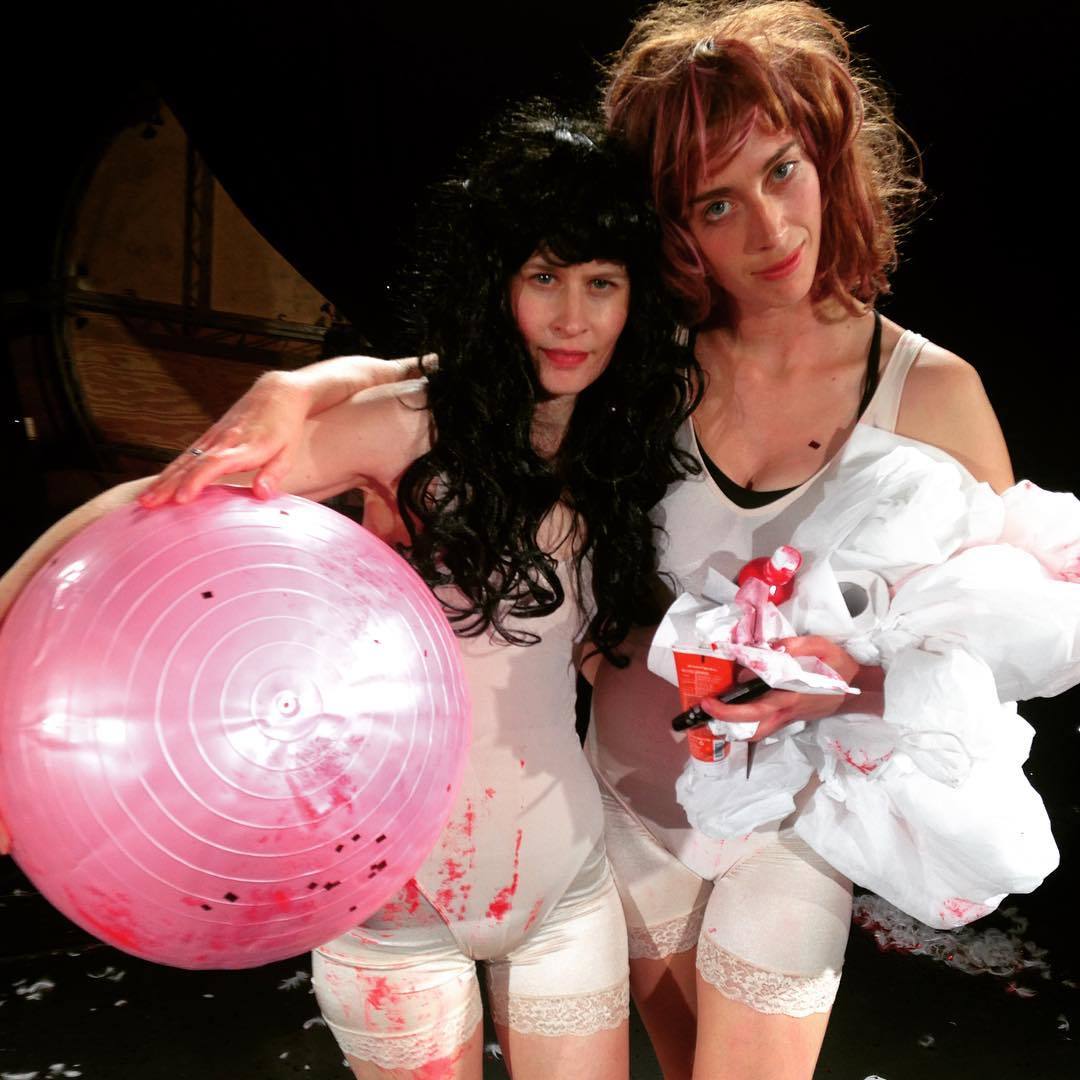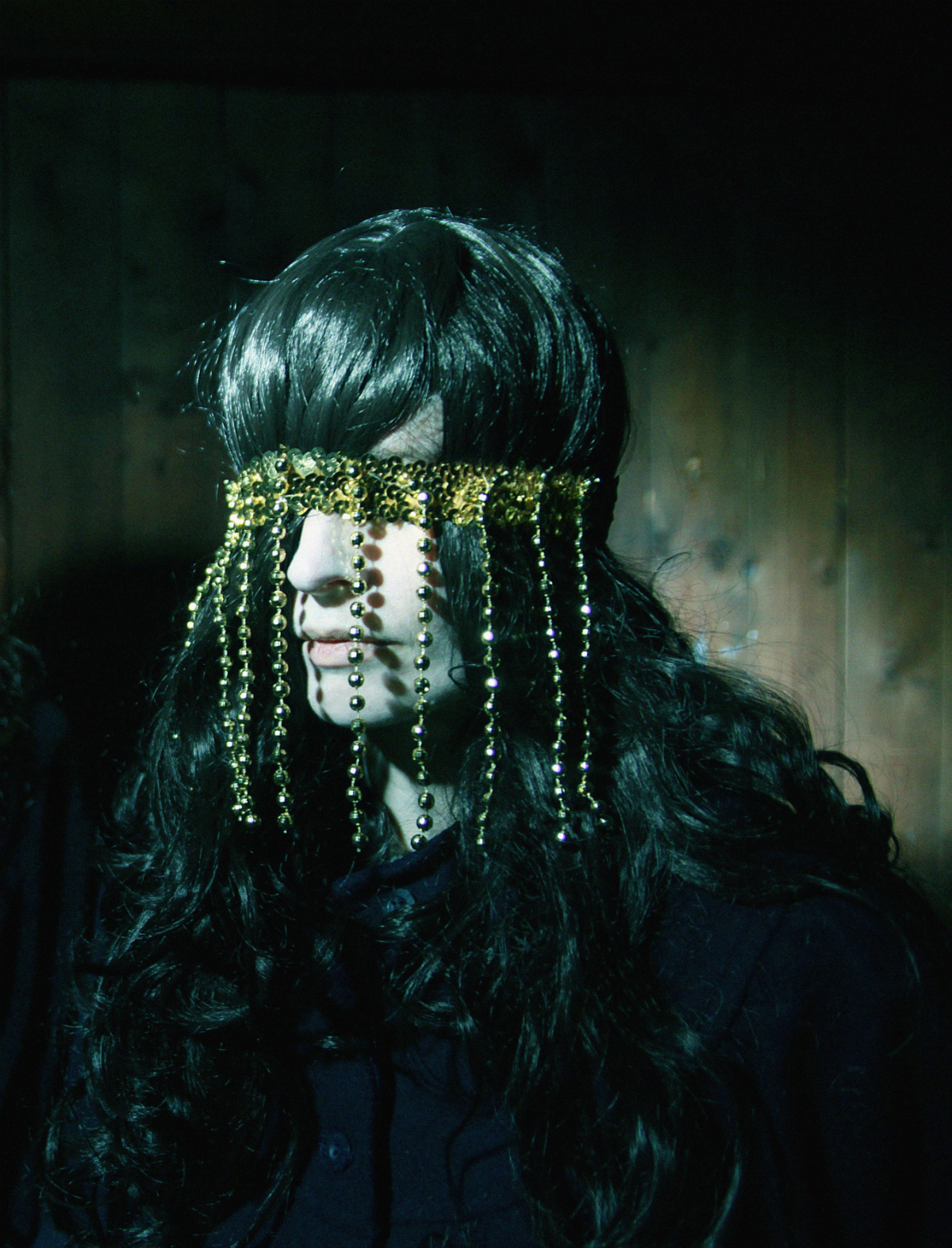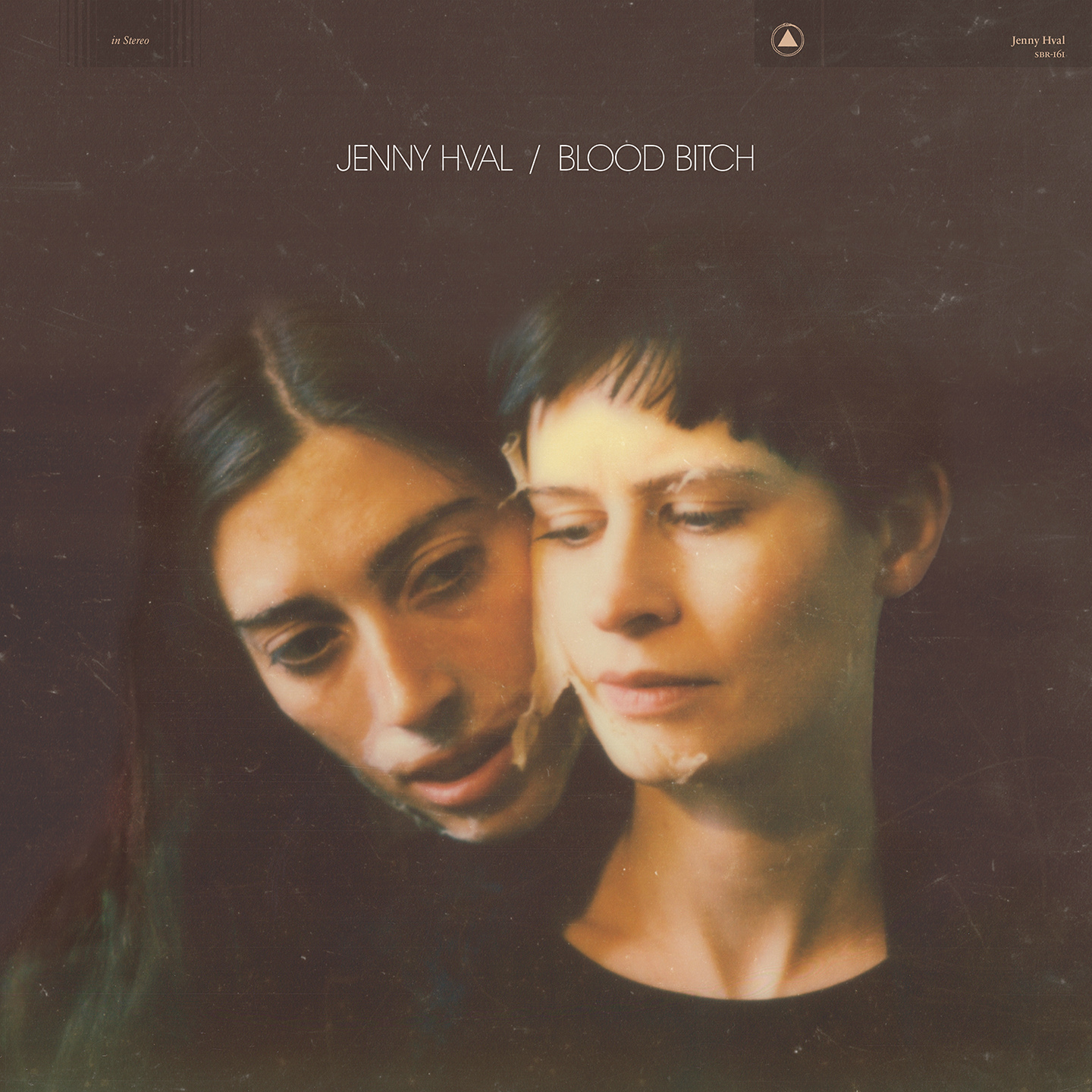At a climactic moment of Jenny Hval‘s Primavera Sound performance, in an ocean of static and noise following the lyrics, “You say I’m free now, that battle is over, and feminism’s over and socialism’s over… I can consume what I want now,” from 2015 album Apocalypse, girl, Hval and her co-performer ecstatically slather their skin with Vaseline and chop chunks from their long blonde wigs, rubbing the synthetic hair on their arms and legs, and stuffing handfuls into the bikini line of their beige shapewear. It is both violent and joyful — part crazed meltdown, part euphoric release fashioned from the very fabrics of oppression.
“I guess it’s not a usual thing to be wearing,” Hval concedes in the leisure centre changing room that’s doubling up as a backstage area, pulling at the flesh tone, elasticated underwear. “I liked the idea of looking naked, but in a really sad way — even more exposed than naked, really, because these are meant to hold things in, they’re meant to make you look good when you wear them under clothes,” she explains. “It’s a type of naked that isn’t sexy, and I find that quite lovely. It goes with my music; the way I write and the way I sing has something naked to it, and I’m not very good at making it appear flawless, or trying very hard to make it seem desirable”.

When the gamine Norwegian artist first took to the stage, she introduced herself, her female tuba-playing co-performer and male DJ, announcing: “We’re Jenny Hval, Jenny Hval sisters, and we’re here to make things more complicated”. It might have sounded trite — a platitude for an audience conceivably congratulating themselves for choosing the challenging, arty act over Brian Wilson performing Pet Sounds on the main stage. But speaking to Jenny, it became clear that the statement represents more than crowd-pleasing sloganeering. Easy soundbites and clickbait feminist tropes are not her currency.
Though the performance alludes to a critique of gendered ‘beauty’ rituals and of the slow violence of the pressure to conform, Hval says she’s not interested in stereotypes. “I mean, I’ve never worn anything like that!” she reasons. “I just like putting on a character that I couldn’t be, in a way, and then being it anyway, and failing and choking on hair and rubbing it all over myself. I like the idea of making a mess”. At one point, Hval’s co-performer draws lipstick on, in increasingly wide circles around her mouth. “It’s taking something that is usually seen as performing gender and then just saying, ‘Well hey, I can draw on my face!’,” she grins. “It’s through making a mess of it I think we’re really wanting to make it into something that’s not about gender; it’s about the things you do when you’re by yourself. I like the idea of making a slightly violent, but also really enjoyable mess with these gendered products. I’ve always liked that. I’ve done it since I was a kid.”
It’s not just the gendered products that Hval seeks to appropriate for her own use, but also words and phrases that aren’t her own, and that she doesn’t necessarily even believe. As for the claim that feminism’s over and socialism’s over, Hval says they’re just words she’s “really tired of hearing” — a fatigue she tried to highlight through a deliberately nasal delivery on the record. “But I still think that I should try them on, like a wig, and see what they do in a song,” she adds. “To me it’s very joyful to sing them, even if I don’t mean them. I think it’s necessary that not just the people who mean it say it, but that I say it too,” she philosophises mischievously. “It’s like taking more lipstick and drawing on the wrong side of the lip.”
If it sounds confusing, and perhaps a little nonsensical, then you’ve understood things perfectly. Hval soundtracks the subversive thrill of deliberately doing something wrong, be it the performance of traditional femininity or indeed the proselytising of contemporary feminism. On the state of the latter, she says it’s difficult topic, but offers that, “It’s good that people are talking a lot about [feminism],” though she wonders “if sometimes the limits of the conversation are very much set by media and the internet, and this constant, distant communication that we have online where everybody can just attack everybody”. Anyone who has ever expressed a feminist or socialist opinion on Twitter can likely vouch for the truth of that.
“There’s a reason why I’m not a journalist,” she muses. “I’m not trying to, first and foremost, make sense of all social commentary, because I just don’t believe in it. I speak to journalists all the time and I love some of their work, but I actually don’t believe that I could say those things — that I maybe refer to in my songs — or that it would make a difference if I said it in that sort of language,” she explains. “I take more interest in things that are very open, and contain a lot of complexity and contradiction.” Her provocative, often parodic lyrics, may not give answers, but they ask nuanced and thought-provoking questions of the connected themes of sex, the body, gender expectations, capitalism, desire and failure.
Following Hval’s preference for abstraction, mimicry and evocation over making neat, concrete statements about social and political topics, it should come as no surprise that on upcoming album Blood Bitch the imagery is extended to the supernatural. “I wonder, do vampires menstruate?” Hval asks in the album promo, above. It’s hardly a mainstream feminist quandary, but vampires are of course intrinsically linked with sex, exploitation and the glamorisation of youth – all topics that very much are part of the canon, and indeed a continuation of the themes of Apocalypse, girl.
The upcoming album takes inspiration from 70s horror and exploitation films that Hval watched while making it. “I found it really interesting to look at these trashy and underrated movies that are often slagged off as being just an excuse to have nudity and lots of women and sex in a movie,” she says. “But in the films I saw, I found a lot of really interesting references and a language of desire that is much more free than what I see 40 years later.” When a naked woman is shown, Hval says, she is never as, “as polished or self conscious” as naked women in contemporary cinema, a trend that has accelerated since the 80s. “It’s interesting to watch the history of porn because you see that the bodies change so much. You go back to the 70s and they look almost supernatural because they’re so natural,” she notes, adding ruefully, “There’s so much that was lost in that clean up”.
As for the focus on vampires in particular, Hval says, “The vampire is a figure that is very ridden with desire,” and notes that “The desire is obviously [reflective of] sexual desire but it is also a death drive, a really destructive desire and this kind of [weariness] of living too long, of old age”. “I don’t think we’re taught much about desire. I don’t think we’re allowed a lot of desire,” she adds, asking, “In all the different processes we learn to make ourselves desirable, do we ever learn to take pleasure in them? To discover what desire is?”.

The album title, Blood Bitch, isn’t taken from the Cocteau Twins song of the same name, but one of Hval’s lyrics. “I got these crazy ideas about vampires and menstrual blood and how it’s all making very much sense that this is the connection — the vampire blood is the menstrual blood,” she says. “Sometimes I come up with very good ideas as to how they are connected,” she explains, but demurs, “I’m not sure if tonight is the night because my brain is fried after playing the show”.
“I love the idea of the ‘Blood Bitch’ as someone who can [embody] both the shedding of blood and the wanting of blood. A kind of vessel for both giving and taking. And so that was a sort of universal exploitation female figure for the album that I really fell in love with,” she explains. “I liked the fact that I was no longer really looking at the contemporary woman taking care of herself or person taking care of him/her/itself, but more like a container of desire and blood and the complexities of desiring life.”
Indeed, it is much easier to speak about the phenomena of women wearing make up, or secret underwear to make them look thinner, than it is to talk about menstruation. Was Hval happy to talk about it? “Very happy. But I didn’t talk about it — I made an album and then realised that it was vampire blood that I was interested in, and that came from, I think, an interest in blood that is taboo — that is, menstruation — and realising how powerful it is. It is the original blood. I don’t want to seem like the essentialist talking about menstruation as this kind of… ‘experience,’ because that’s not what I mean. It’s more like, why is it taboo? It’s taboo because it’s an amazing concept of life and it’s painful blood too because not everyone has it. You have it only when you’re in the middle of your life; it separates youth from the grown up and the older age, and it is about desire. Well, it should be allowed to be about desire, not about, you know, ‘I’m ready now, take me please!’.”
One of the more explicitly political tracks on the album, Untamed Region, samples the voice of the documentary filmmaker Adam Curtis. Taken from a film about how the constant contradictions of Government action can make coherent opposition all but impossible, Curtis says, “It means that we as individuals become ever more powerless, unable to challenge anything, because we live a state of confusion and uncertainty.” How does it connect? “For a while, I really wanted to make an album that had a side A and B, and A was about love, and it didn’t work, because love is a concept that sits too easy with capitalism; and side B would be, like, the sex! Which, when it doesn’t sell, can still not really sit. So, Adam Curtis came in with my love thoughts,” Hval says. “I really liked the voice and partly I also wanted to have him there to be a sort of ancient documentary reminder of something that is to do with the desire of capitalism. I really wanted to depict a desire that capitalism cannot reach and also expose the sort of empty desire that is advertising desire.”
“Big attempt; total failure,” she concludes. “But there’s something else, you know, a lot of music came out.”
Blood Bitch is out 30 September on Sacred Bones.
